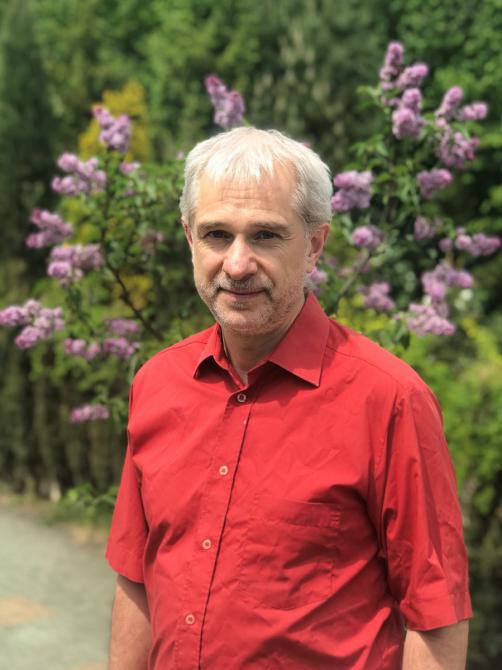Marek Wójtowicz, PhD, DLitt, Assoc. Prof. | Photo by Teresa Wójtowicz
| Katarzyna Stołpiec |
Transhumanism is a contemporary trend of thought involving many scientific disciplines. It can be assigned to philosophy, humanities or engineering of technological processes. It also includes theology, the role of which in the project on the religious aspects of transhumanism is being studied by Marek Wojtowicz, PhD, DLitt, Assoc. Prof. from the Faculty of Theology of the University of Silesia, member of the Council of the Institute of Philosophy at the Faculty of Humanities of the University of Silesia.
“The world is on the verge of great changes”, states the philosopher. “The more we explore our present, the more we become witnesses of revolutionary achievements. Although the pace of development of social life, technology, and thus the standard of living, already seems high, members of transhumanist organisations believe that humanity has closed itself in certain limiting frames, beyond which no one is able to rise”.
Members of this movement also profess the belief that a great breakthrough awaits humanity, which has so far remained in the dream world. In their opinion, we are ready for it, the evidence of what they see in the direction and logic of changes in our times.
“The goals set by transhumanists are incredibly broad”, notes Prof. Marek Wojtowicz. “They claim that we will finally fulfil all the desires of the human heart and mind”.
First of all, transhumanists want to enable human longevity. They hope that thanks to genetic engineering, which is becoming more and more advanced, people will be able to live to be several thousand years old. This would be possible thanks to regular transplants – synthetic organs will be produced using a 3D printer, which will then be implanted in place of damaged or diseased organs. These will be replaced with new ones in a few years if necessary. In order to diagnose their defectiveness earlier, a chip will be implanted in the body, which, regardless of the human awareness, will monitor the functionality of their body and “report” threats, which are often, for example, a heart attack, kidney failure or cancer. It is estimated that in 2100, the average human life expectancy will reach five thousand years – according to Aubrey de Gray, one of the most famous transhumanists (A. de Grey, The War on Aging, in: The Scientific Conquest of Death. Essays on Infinite Lifespans, Buenos Aires 2004, p. 38).
Photo by Wilmer Martinez | Unsplash
What will happen with human identity? Transhumanists argue that each person’s self can be reduced to IT processes. Files protected and stored in the cloud, on external drives or other media can last forever. The same scheme is planned for the storage of human consciousness. Transhumanists say that in order to survive forever, one must become independent from what is unreliable in us, i.e. from the human body. In their opinion, this is possible by “mind transfer”, i.e. “scanning” it, processing it into IT content and transferring it to a separate medium called a mind file. It will be possible to upload various skills to such files, such as knowledge of foreign languages, world history, sports, craft or culinary skills. Such a person will have access to all knowledge and all achievements and information that are contained in the network, they will have an absolute memory.
Transhumanists argue that the proposed changes will please those who love their lives and do not want to grow old or die. By uploading knowledge and skills, people will become extremely versatile in various areas of life. Where will God find His place when man becomes limitless? Supporters of religious transhumanism explain the actions of representatives of this movement with quotations from the Bible: “you are to be perfect, even as your Father in heaven is perfect” (Matthew 5:48) or “be fruitful, and multiply, and replenish the earth, and subdue it” (Genesis 1:28). In their view, God requires man to be as perfect as He is. Prof. Marek Wójtowicz explains that although transhumanism can be perceived as an alternative vision of the world, some supporters of this trend see it as a new religious aspect, thanks to which they will achieve the complete fulfilment of God’s will, complete freedom, which Christ taught, and use their full potential which they received as humans. They are convinced that all these “supernatural” skills will only serve to build good and peace. To demonstrate their recognition of God’s primacy, religious transhumanists band together in associations, both physical and online ones, dedicated to advancing humanity. Many of them draw heavily from Mormonism, one of the branches of Christianity that is very popular in the United States. Transhumanists see in their idea only the right way for humanity and the pious fulfilment of man’s duties towards God, as well as the path of personal and communal religious development. Modern Mormon theologians propose that we begin to move away from the faith understood as ancient beliefs from the time of Jesus and adapt it to today’s civilisation and cultural state, so that modern religion meets the requirements of our times.
The researcher from the University of Silesia indicates where the main line of dispute between Christianity and transhumanism is.
“One of the biggest differences has to do with understanding suffering”, he says. “Christianity identifies suffering not only with the effect of sin, but also draws good from it in the form of ennobling oneself, learning respect for people and nature, accepting evil in the world and dealing with it, overcoming one’s own weaknesses, which makes a person stronger and allows them to grow stronger in love. Walking the path leading to a specific goal and overcoming problems is necessary to realise your humanity. Achieving a goal without effort is meaningless. Depriving a man of toil and effort is stripping them of their humanity”, sums up the scientist.
Is it possible to achieve a perfect state in the likeness of God by one’s own efforts? The goal that transhumanists want to achieve is to reach the limit of the maximum human capabilities, including immortality.
The Church’s side does not raise the alarm, because the currently presented vision of transhumanism is largely utopian. However, it should not be underestimated, because the processes envisaged by transhumanists may significantly differ from the ethical principles set by the Catholic Church.
Article ‘Religious Aspects of Transhumanism’ was published in the June issue of University of Silesia Magazine No. 9 (309).







